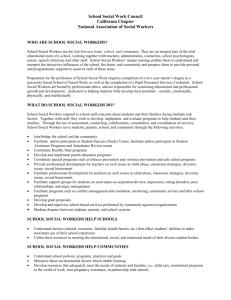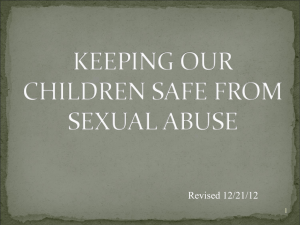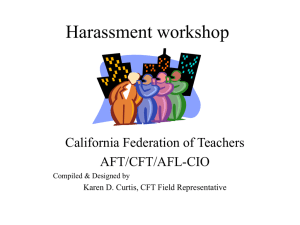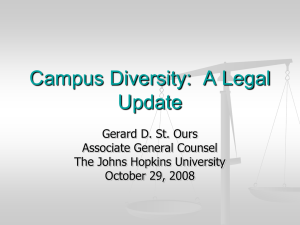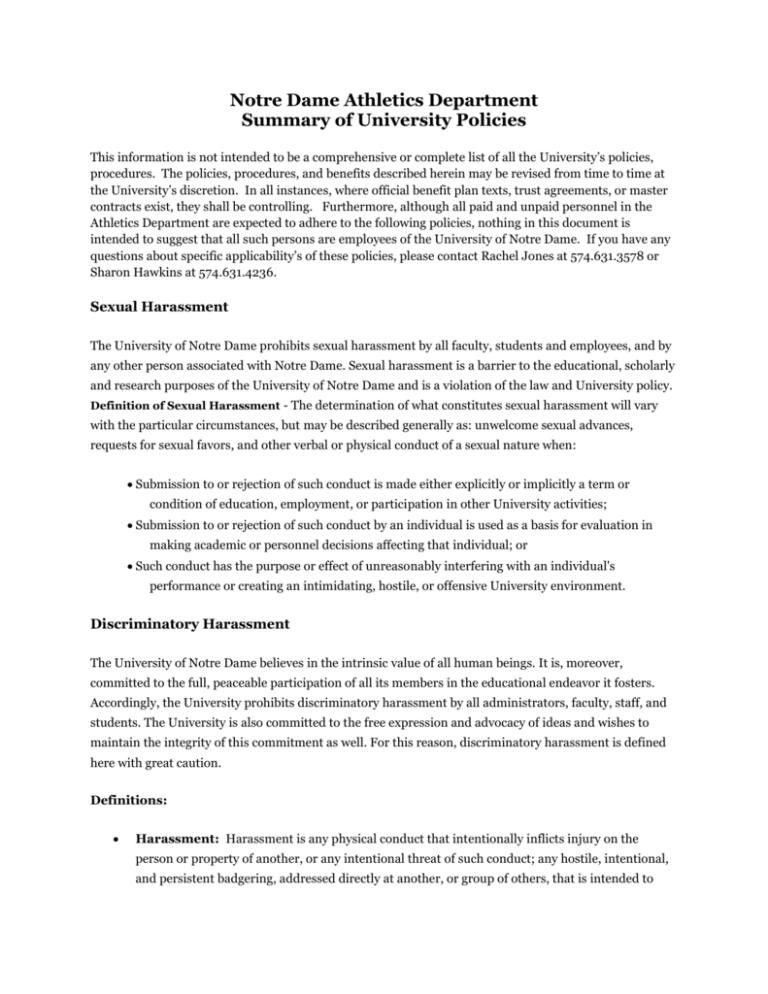
Notre Dame Athletics Department
Summary of University Policies
This information is not intended to be a comprehensive or complete list of all the University’s policies,
procedures. The policies, procedures, and benefits described herein may be revised from time to time at
the University’s discretion. In all instances, where official benefit plan texts, trust agreements, or master
contracts exist, they shall be controlling. Furthermore, although all paid and unpaid personnel in the
Athletics Department are expected to adhere to the following policies, nothing in this document is
intended to suggest that all such persons are employees of the University of Notre Dame. If you have any
questions about specific applicability’s of these policies, please contact Rachel Jones at 574.631.3578 or
Sharon Hawkins at 574.631.4236.
Sexual Harassment
The University of Notre Dame prohibits sexual harassment by all faculty, students and employees, and by
any other person associated with Notre Dame. Sexual harassment is a barrier to the educational, scholarly
and research purposes of the University of Notre Dame and is a violation of the law and University policy.
Definition of Sexual Harassment - The determination of what constitutes sexual harassment will vary
with the particular circumstances, but may be described generally as: unwelcome sexual advances,
requests for sexual favors, and other verbal or physical conduct of a sexual nature when:
Submission to or rejection of such conduct is made either explicitly or implicitly a term or
condition of education, employment, or participation in other University activities;
Submission to or rejection of such conduct by an individual is used as a basis for evaluation in
making academic or personnel decisions affecting that individual; or
Such conduct has the purpose or effect of unreasonably interfering with an individual's
performance or creating an intimidating, hostile, or offensive University environment.
Discriminatory Harassment
The University of Notre Dame believes in the intrinsic value of all human beings. It is, moreover,
committed to the full, peaceable participation of all its members in the educational endeavor it fosters.
Accordingly, the University prohibits discriminatory harassment by all administrators, faculty, staff, and
students. The University is also committed to the free expression and advocacy of ideas and wishes to
maintain the integrity of this commitment as well. For this reason, discriminatory harassment is defined
here with great caution.
Definitions:
Harassment: Harassment is any physical conduct that intentionally inflicts injury on the
person or property of another, or any intentional threat of such conduct; any hostile, intentional,
and persistent badgering, addressed directly at another, or group of others, that is intended to
intimidate its victim(s) from any University activity; or any verbal attack, intended to provoke the
victim to immediate physical retaliation.
Discriminatory Harassment: Conduct, as described above, constitutes discriminatory
harassment, if it is accompanied by intentionally demeaning expressions concerning the race,
gender, religion, age, veteran status, sexual orientation, national origin, or disability of the
victim(s).
Consensual Relationships
Because of the potential for abuse or the appearance of abuse and the inherent differential in authority,
the University prohibits any faculty member or employee of the University from engaging in a romantic
and/or sexual relationship or in romantic and/or sexual conduct with any student currently enrolled as an
undergraduate at Notre Dame. Furthermore, because of the potential for abuse or the appearance of
abuse and the inherent differential in authority between graduate students and their educators,
counselors, and others holding positions of authority over them, the University prohibits any member of
the University community from engaging in a romantic and/or sexual relationship or in romantic and/or
sexual conduct with any graduate student whom he or she educates, counsels, coaches, supervises or
evaluates in any way.
Protection of Children
The purpose of this policy is to ensure the fulfillment of our moral obligation to protect minor children as
vulnerable members of society and the obligation that is mandated by Indiana law. Specifically, this policy
addresses the abuse of minor children. Abuse of a minor child includes serious endangerment of a child’s
physical or mental health due to injury by act or omission, including acts of sexual abuse. Sexual abuse
includes contacts or interactions between a child and an adult when the child is being used as an object of
sexual gratification for the adult. A child is abused whether or not this activity involves explicit force,
whether or not it involves genital or physical contact, whether or not it is initiated by the child, and
whether or not there is discernible harmful outcome.
Indiana law requires anyone who has reason to believe that a child has been abused or neglected to report
the abuse or neglect. Additional obligations are imposed upon institutions such as the University. In order
to meet the reporting obligation, as well as to provide appropriate protection to children, this policy
applies to abuse that allegedly occurs on our campus, on property owned or leased by the University, or
while members of the faculty, staff or student body are participating in a University connected activity off
campus.
A University employee, or anyone external to the University who has reason to believe that a minor
has been abused on our campus, on property owned or leased by the University, or while members
of the faculty, staff or student body are participating in a University connected activity off campus or
who has received a report of such alleged abuse must report this information to either 1) his or her
supervisor or the Director, Dean or Vice President in charge of his or her department; or 2) if the
report involves another employee, the direct supervisor of the alleged abuser or the Director, Dean
or Vice President in charge of the alleged abuser’s department; or 3) if the report involves a student,
to the Vice President for Student Affairs.
In all situations, those who receive a report of abuse must immediately report the allegation to the
Vice President and General Counsel at 574.631.6411, which will in turn notify law enforcement or
other appropriate state child protection agencies and take other steps as set forth in the University’s
policy. Of course, any individual who becomes aware of child abuse may also contact law
enforcement or Indiana Child Protective Services directly in addition to the required reporting to
University officials.
Athletic Department Alcohol Policy
Notre Dame athletic administrators, coaches and other departmental staff members are reminded of their
responsibility to serve as role models for the student population. Listed below are standards that have
been adopted by the Athletic Department and/or the University community and should govern the
conduct of all Athletic Department employees:
Athletic department personnel should be aware that Indiana law prohibits drinking by those
under the age of 21. Coaches, administrators and athletic department staff members shall not
knowingly allow underage drinking by student-athletes, student workers (e.g. student managers
and trainers) or recruits under their supervision. Coaches, administrators and athletic
department staff members shall not knowingly permit intoxication by a student-athlete, student
worker or recruit under their supervision, irrespective of the age of the student.
University funds may not be used to purchase alcohol for consumption by student-athletes,
student workers (e.g. student managers and trainers) or recruits at any time, irrespective of the
age of the individuals involved or the legal drinking age in the jurisdiction where the alcohol is
purchased.
Coaches, administrators and athletic department staff members may not provide or serve alcohol
to a student-athlete, student worker or recruit.
Coaches, administrators and departmental staff members should use their best judgment when
visiting restaurants or establishments where alcohol is served, and should not consume alcohol in
the presence of a student-athlete, except for students working at a university event.
Coaches, administrators and athletic department staff members should avoid being present when
student-athletes and student workers consume alcohol. Occasionally, they will find themselves
obligated to attend functions where students over 21 are consuming alcohol. In such situations,
they should attempt to avoid socializing with students who are consuming alcohol and take their
leave as soon as they can reasonably do so without offending the host.
Coaches, administrators and athletics department staff members shall not knowingly allow
student-athletes or student workers to consume alcohol during any official team activity,
including receptions, dinners and special events. Nor shall they permit alcohol to be present or
consumed while in transit to practice or competition, regardless of whether personal vehicles,
buses, vans or airplanes are used.
Coaches, administrators and athletic department staff members shall not permit or allow studentathletes or student workers to serve or provide alcohol to a recruit.
If coaches, administrators or athletic department staff members become aware of conduct
outlined above, or drinking at any time on team trips, they should take appropriate action to stop
it.
Head coaches may adopt more restrictive rules relative to alcohol use for their respective teams.
ACKNOWLEDGEMENT AND SIGNATURE
Failure to adhere to the policies and standards outlined above may result in appropriate disciplinary
action by the University of Notre Dame and/or the Athletics Department.
By signing this form, I acknowledge that I have received the following policies, and will read and abide by
them:
Sexual Harassment
Discriminatory Harassment
Consensual Relationships
Protection of Children
Athletics Department Alcohol Policy
____________________
Print Name
_____________________
Signature
_____________
Date




